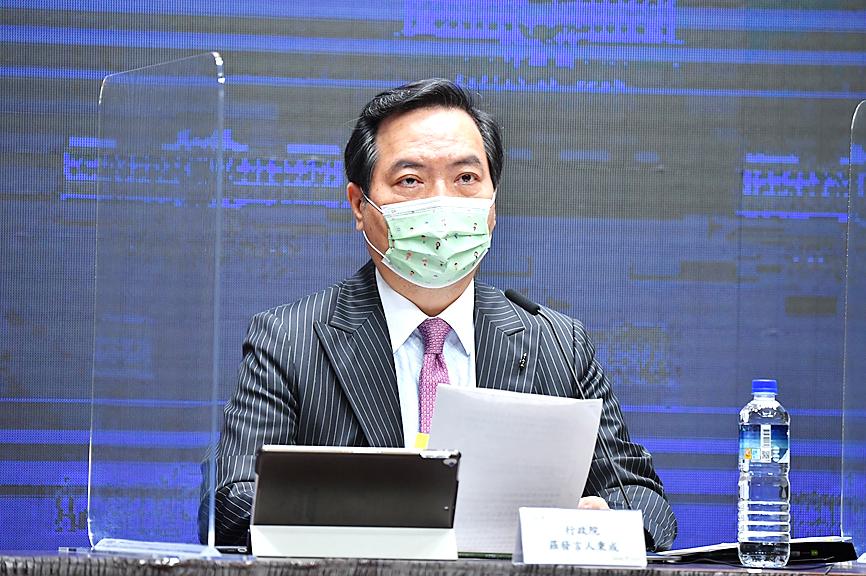The Executive Yuan yesterday approved the Buddhist Compassion Relief Tzu Chi Foundation’s application to procure COVID-19 vaccines for the government.
In a surprising U-turn, the Cabinet approved the nonprofit’s bid to obtain 5 million doses of the Pfizer-BioNTech vaccine, saying that it would follow the same model set out for the Hon Hai Precision Industry Co-affiliated YongLin Foundation, and Taiwan Semiconductor Manufacturing Co (TSMC).
The Tzu Chi foundation thanked the government for its backing, saying that it hoped that the process to obtain vaccines would proceed smoothly, so that Taiwan could return to normal as soon as possible.

Photo courtesy of the Executive Yuan
The application is meant to help safeguard the health of Taiwanese, it said, thanking other initiatives from the private sector to alleviate the nation’s outbreak of COVID-19.
The Tzu Chi foundation on Wednesday last week applied with the Food and Drug Administration to try to obtain the vaccines, following similar moves by YongLin and TSMC.
The Executive Yuan initially said that the application of Tzu Chi would not be considered alongside those of Yonglin or TSMC, calling them “different,” without elaborating.
President Tsai Ing-wen (蔡英文) on Saturday last week wrote on Facebook that she had spoken with foundation Dharma Master Cheng Yen (證嚴法師) via videoconference, telling Cheng that the Central Epidemic Command Center would consider its request.
Executive Yuan spokesman Lo Ping-cheng (羅秉成) later that day announced that the application would be considered as a special project, following the model of the Yonglin and TSMC applications.
After reviewing Tzu Chi’s application, the government hopes to expedite negotiations to obtain the vaccines as early as possible, Lo said, without elaborating on the reason for the Executive Yuan’s reversal.
Tzu Chi executive director Yen Po-wen (顏博文) last month said that should the purchase proceed as planned, vaccines would be directly imported to Taiwan from the manufacturer in Germany.

The first global hotel Keys Selection by the Michelin Guide includes four hotels in Taiwan, Michelin announced yesterday. All four received the “Michelin One Key,” indicating guests are to experience a “very special stay” at any of the locations as the establishments are “a true gem with personality. Service always goes the extra mile, and the hotel provides much more than others in its price range.” Of the four hotels, three are located in Taipei and one in Taichung. In Taipei, the One Key accolades were awarded to the Capella Taipei, Kimpton Da An Taipei and Mandarin Oriental Taipei. Capella Taipei was described by

EVA Airways today confirmed the death of a flight attendant on Saturday upon their return to Taiwan and said an internal investigation has been launched, as criticism mounted over a social media post accusing the airline of failing to offer sufficient employee protections. According to the post, the flight attendant complained of feeling sick on board a flight, but was unable to take sick leave or access medical care. The crew member allegedly did not receive assistance from the chief purser, who failed to heed their requests for medical attention or call an ambulance once the flight landed, the post said. As sick

The Taichung District Court yesterday confirmed its final ruling that the marriage between teenage heir Lai (賴) and a man surnamed Hsia (夏) was legally invalid, preventing Hsia from inheriting Lai’s NT$500 million (US$16.37 million) estate. The court confirmed that Hsia chose not to appeal the civil judgement after the court handed down its ruling in June, making the decision final. In the June ruling, the court said that Lai, 18, and Hsia, 26, showed “no mutual admiration before the marriage” and that their interactions were “distant and unfamiliar.” The judge concluded that the couple lacked the “true intention of

A drunk woman was sexually assaulted inside a crowded concourse of Taipei Railway Station on Thursday last week before a foreign tourist notified police, leading to calls for better education on bystander intervention and review of security infrastructure. The man, surnamed Chiu (邱), was taken into custody on charges of sexual assault, taking advantage of the woman’s condition and public indecency. Police discovered that Chiu was a fugitive with prior convictions for vehicle theft. He has been taken into custody and is to complete his unserved six-month sentence, police said. On Thursday last week, Chiu was seen wearing a white